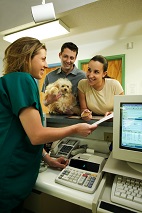 Spring has sprung and people’s pets are happily romping about everywhere, including where they don’t belong and might get hurt, and they’re eating anything colorful or sweet, including things that can poison them.
Spring has sprung and people’s pets are happily romping about everywhere, including where they don’t belong and might get hurt, and they’re eating anything colorful or sweet, including things that can poison them.
There’s nothing worse than when a playful, curious pet suddenly becomes an injured or sickened one. To prevent this from happening you’ve been warning your customers, for months now, about the dangers of spring.
Curiosity Could Kill the Cat, or Any Pet
You put a poster in your lobby letting them know that tulips, daffodils, lilies and crocus are big, colorful, interesting-to-sample (from a pet’s point of view) flowers that all happen to be poisonous. Another poster explains that the zinc in a penny can kill a pet, as can antifreeze or the Xylitol found in some sugar-free chewing gums, both of which taste sweet.
Thankfully, your customers already suspect that insecticides would be bad for animals, so rather than waste wall space on those posters you put up ones warning that microorganisms in yard compost, cocoa in coco shell mulch, and even innocuous soil amendments like blood meal or iron can all poison pets. Same goes for vanilla extract, cough syrup or anything else that has alcohol in it. And while Permethrin is great to get rid of fleas on dogs, it will poison a cat. You even had special instructions for cat owners: to check their window and door screens and make sure a curious house cat won’t fall or escape.
Allergies and Weight Gain
You tried to explain that pets have allergies just like people do and that it may take their systems a while to adapt to springtime pollen. You reminded them that all sorts of pathogens – most fearfully heartworm in dogs and encephalomyelitis for horses – proliferate in the spring and easily move from one pet to another when they play together.
 And when it comes to playing you also tried to explain – especially to the children, who are also going crazy with spring fever – that pets, like people, gain weight and lose muscle tone over the winter, so they need time to trim down and regain their athletic playfulness before they can go full-bore again.
And when it comes to playing you also tried to explain – especially to the children, who are also going crazy with spring fever – that pets, like people, gain weight and lose muscle tone over the winter, so they need time to trim down and regain their athletic playfulness before they can go full-bore again.
But, alas, none of this worked. It didn’t work last year, either, but that didn’t prevent you from trying this year, and we know you’ll try again next winter.
Meanwhile, just like last year, your customers are bringing you the usual stream of springtime injuries and afflictions. Torn ligaments and tendons, broken limbs, all sorts of foreign objects in stomachs and intestines, a wide variety of toxic shocks, a great many preventable diseases and, of course, a plethora of lacerations keep you busy.
Offer Payment Options
Owners are often shocked and dismayed by their pet’s condition, and sometimes completely unprepared to deal with their pet’s injuries or afflictions financially as well. When removing a typical intestinal foreign object can cost around $2,000, and when setting a broken leg can easily come to $1,500, you might consider preparing your business to deal with distraught pet owners faced with a significant – and out-of-the-blue – expense.
The last thing you want is to have a pet owner consider euthanasia because he can’t afford treatment. And the other last thing you want is for a pet owner to write you a check only to put a stop payment on it or to let it bounce when treatment doesn’t work or doesn’t turn out the way he expected it to.
One solution is VET-RDC, or Veterinarians Remote Deposit Capture. VET-RDC has a multiple check payment option available, so a pet owner can write two to four checks for the full amount but that will be deposited over the course of the next thirty days. This makes it easy for your customer to time payment to coincide with his cash flow, and allows him to obtain services he might not otherwise be able to afford.
VET-RDC also offers check guarantee. Once you have verified a payment via check you are guaranteed payment – even if a distraught client stops payment on the check or otherwise tries to evade making it good. This way you get paid without having to chase after a client who may be in a fragile or emotional state.
Lastly, there’s the RDC of VET-RDC. Remote Deposit Capture saves time and money by allowing merchants to deposit checks from the convenience of their desktop.
And meanwhile, in the hopes that you’ll help at least some of your furry patients escape injury or poisoning, keep teaching your customers about the dangers of spring. But also prepare your business to help pet owners confronted with unexpected expenses, and to continue to function even if a heartbroken client makes a questionable decision. Learn more here.



